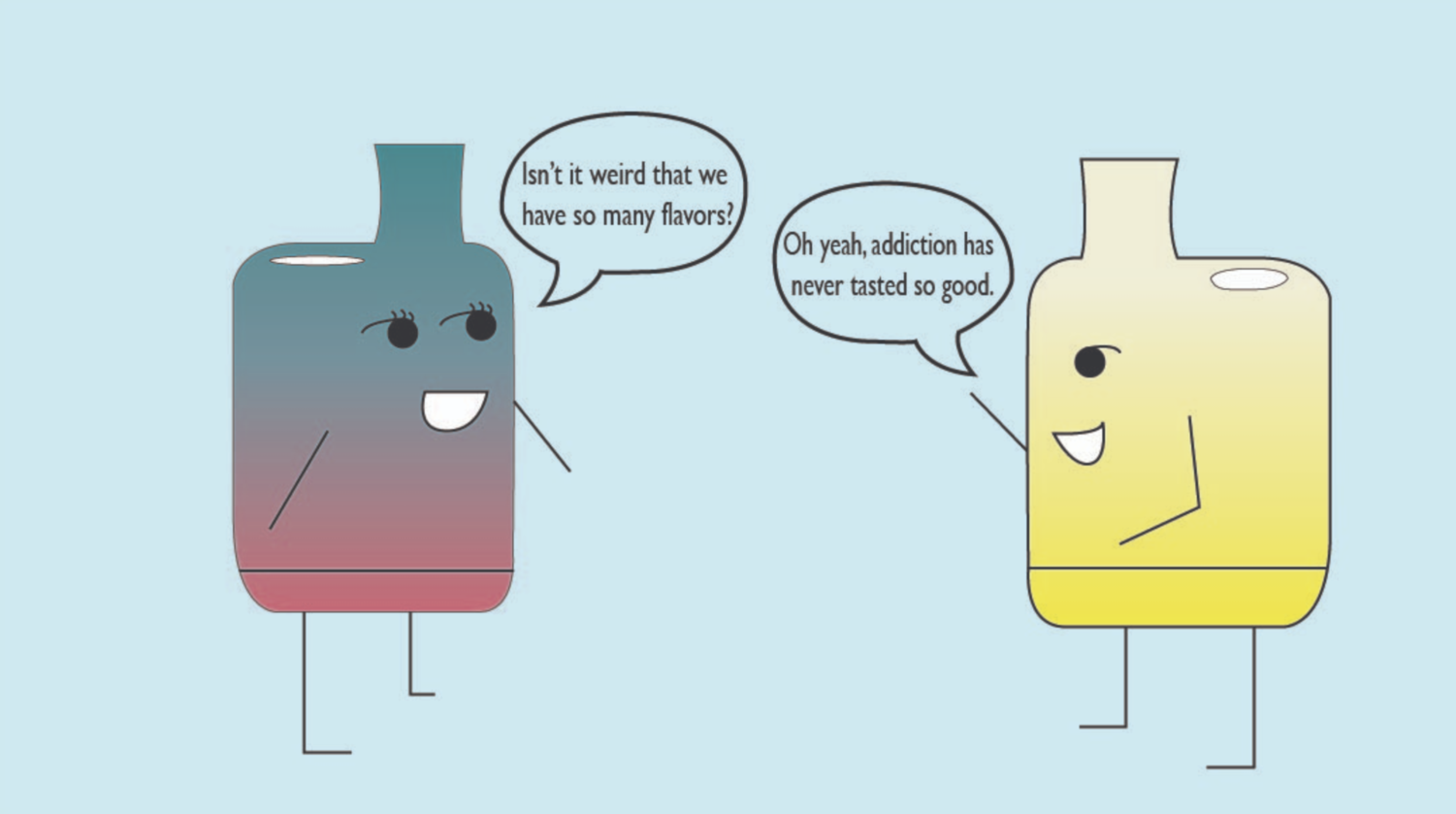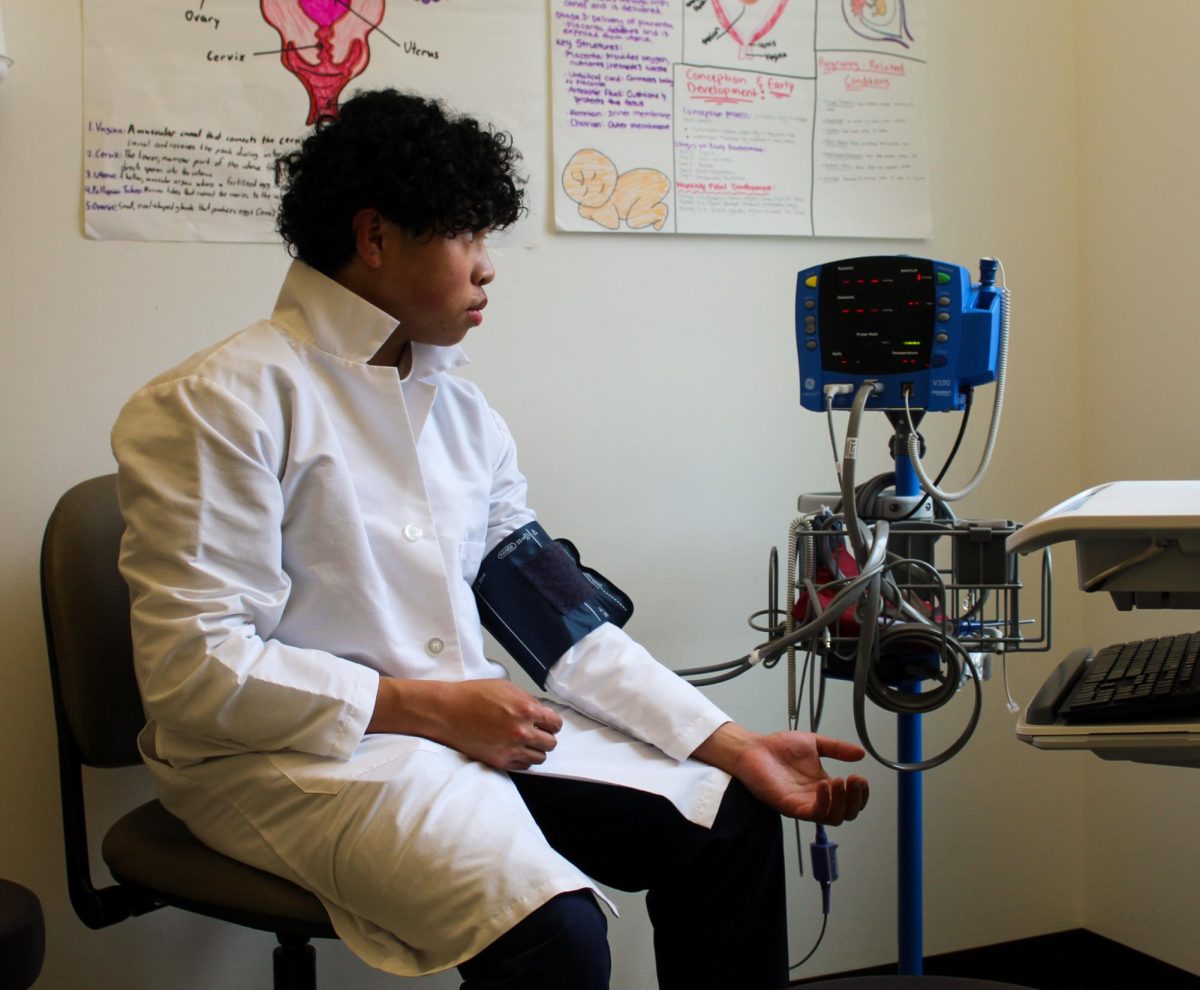According to the United States Surgeon General, nicotine addiction is an epidemic, and it doesn’t discriminate. Those as young as middle schoolers have discovered the highs and inevitable lows of nicotine. Nicotine is a highly addictive chemical compound widely used in cigarettes and e-cigs. It is a stimulant drug that speeds up the messages traveling between the brain and body, releasing a chemical called dopamine in the same regions of the brain as other addictive drugs, such as heroin and cocaine. It causes mood-altering changes that temporarily create a feel-good sensation. Nicotine involves physical and psychological factors that make it difficult to quit.
If the nicotine craving is not satisfied, it can cause symptoms such as irritability, frustration, anger, restlessness, impatience and sleep disturbances. Senior Darla Montague* (she/her), who is six months sober, had similar experiences.
Montague began using nicotine in eighth grade after being exposed to the drug by her father. She considered herself to be addicted and had nicotine impact her day-to-day life. Nicotine became something that she no longer used to feel better but rather to feel normal.
“[I used nicotine] just to keep me on a baseline, just to have something, and I don’t know how to describe how intense the feeling was of needing it,” said Montague. “I needed it constantly, and I was really upset when I lost my Juul. Like, you start getting really irrationally angry sometimes when you can’t find it.”
Montague realized how bad her addiction got when she noticed her inability to cope in difficult situations without nicotine. She said that there was rarely a moment that the thought of nicotine didn’t occupy her mind or when she wasn’t in possession of her device.
“If I was in a really heated argument with somebody, like in a relationship, I would hit it in the middle of the argument and just very emotional moments,” said Montague. “Every single morning. The first thing I think of is nicotine.”
According to the American Cancer Society, a large part of the reason many begin using nicotine in the first place is because of the people surrounding them. Sophomore Khalil Sanchez* (he/him) is currently addicted to the substance, and he believes that the use of it is very normalized.
“Every time I go in the bathroom, people are using it, and when my brother’s home from college, he’s always using it, and every single one of my friends uses it,” said Sanchez.
A gateway into addiction for nicotine users is attempting to learn the tricks that can be done with smoke inhaled from the devices. Junior Suzy Lancaster* (she/her) began using nicotine out of curiosity. At first she didn’t care for it much, but after going through the process of repeatedly learning and practicing the tricks, she gradually became addicted. Senior Paul Elian* (he/him) had the same introduction and had wanted to use nicotine after seeing his friends do it.
“Some people will strictly hit it for the buzz. Some people are doing it for more fun or they enjoy doing tricks,” said Elian.
Nicotine is highly accessible, which allows for more students to get their hands on nicotine from friends and peers. Some of the main ways to acquire nicotine are finding a store that doesn’t ask for identification, having a fake identification card or buying from a peer. Elian uses his fake identification for not only his own products, but for others as well.
“I always bought it from the store and then this year, I had freshmen ask me to get them stuff, so then I’d make some easy cash,” he said.
Since Sanchez was able to easily acquire it, he began using nicotine consistently until eventually he couldn’t stop. He first realized it was a problem when he would try to quit but then come back to it less than 24 hours later. It became a persistent habit for him and was something that was often on his mind.
“I know I should stop, but I always procrastinate it and like, ‘Okay, I’ll stop another time,’ and then it just never happens,” said Sanchez.
Lancaster also had difficulty quitting since her withdrawals took a substantial toll on her mind. The first few days of being clean, she wasn’t able to think properly. Her days began feeling longer and her emotions became hard to control.
“You’re very emotional. You overthink. You’re overthinking literally everything, and you have suicidal thoughts,” said Lancaster.
The quitting process often varies depending on the person due to environmental, psychological, social and genetic factors. For some it many be a significant challenge, but it wasn’t for Montague. She quit cold turkey — the process of quitting abruptly instead of gradually easing off of a substance — and it worked, going significantly better than expected. Montague said that while present, the withdrawals from nicotine were not as bad as she initially had thought they would be. The hardest parts of quitting were the anxiety she experienced without nicotine, and the temptation of being around her friends or parties. At the beginning of the process, Montague had to avoid situations where she could be tempted.
“I remember my first party, I had an extreme amount of anxiety because people were hitting things in front of me, and one of my friends was in the backseat hitting something, and I almost broke a one-month sobriety,” she said.
Montague is happy she quit, and while she still has friends who continue to use nicotine, she encourages everyone to quit. She emphasizes the importance of stopping before serious consequences are on the line. While Montague said fearing what will happen if you don’t quit makes it significantly easier to do so, the most important part is doing it for yourself and wanting to stop.
“What’s funny is those devices were made for cigarette smokers to stop smoking, but now people are latched on to them. It’s kind of ironic.”
Montague believes that quitting was ultimately her choice and was aided by her family and significant other, who provided the driving factor to push her to quit.
“My partner is more important than my relationship with nicotine. The only way you can quit nicotine is if you actually want to, and you have a motivator. And you have trust in yourself that you can actually do that,” said Montague.













